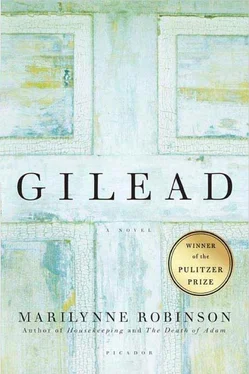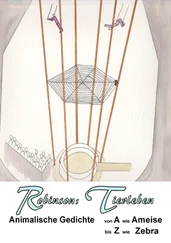I walked over to Boughton’s to see what he was up to. I found him in a terrible state of mind. Tomorrow would have been his fifty-fourth anniversary. He said, “The truth is, I’m just very tired of sitting here alone. That’s the truth.” Glory is there doing everything she can think of to make him comfortable, but he has his bad days. He said, “When we were young, marriage meant something. Family meant something. Things weren’t at all the way they are today!” Glory rolled her eyes at that and said, “We haven’t heard from Jack for a little while and it is making us a bit anxious.”
He said, “Glory, why do you always do that? Why do you say us when I’m the one you’re talking about?”
She said, “Papa, as far as I’m concerned, Jack can’t get here a minute too soon.”
He said, “Well, it’s natural to worry and I’m not going to apologize for it.”
She said, “I suppose it’s natural to take your worrying out on me, too, but I can’t pretend I like it.”
And so on. So I came back home.
Boughton was always a good-hearted man, but his discomforts weary him, and now and then he says things he really shouldn’t. He isn’t himself.
***
I’m sorry you are alone. You are a serious child, with not much occasion to giggle, or to connive. You are shy of other children. I see you standing up on your swing, watching some boys about your age out in the road. One of the bigger ones is trying out a beat-up old bicycle. I suppose you know who they are. You don’t speak to them. If they seem to notice you, you’ll probably come inside. You are shy like your mother. I see how hard this life is for her that I’ve brought her into, and I believe you sense it, too. She makes a very unlikely preacher’s wife. She says so herself. But she never flinches from any of it. Mary Magdalene probably made an occasional casserole, whatever the ancient equivalent may have been. A mess of pottage, I suppose.
I mean only respect when I say that your mother has always struck me as someone with whom the Lord might have chosen to spend some part of His mortal time. How odd it is to have to say that after all these centuries. There is an earned innocence, I believe, which is as much to be honored as the innocence of children. I have often wanted to preach about that. For all I know, I have preached about it. When the Lord says you must “become as one of these little ones,” I take Him to mean you must be stripped of all the accretions of smugness and pretense and triviality. “Naked came I out of my mother’s womb,” and so on. I think I will preach on that during Advent. I’ll make a note. If I can’t remember speaking about it before, no one else is likely to remember. I can imagine Jesus befriending my grandfather, too, frying up some breakfast for him, talking things over with him, and in fact the old man did report several experiences of just that kind. I can’t say the same for myself.
I doubt I’d ever have had the strength for it. This is something that has come to my mind from time to time over the years, and I don’t really know what to make of it.
It has pleased me when I have thought your mother felt at home in the world, even momentarily. At peace in it, I should say, because I believe her familiarity with the world may be much deeper than mine. I do truly wish I had the means to spare you the slightest acquaintance with that very poverty the Lord Himself blessed by word and example. Once when I worried about this out loud, your mother said, “You think I don’t know how to be poor? I done it all my life.” And still it shames me to think that I will leave you and your mother so naked to the world — dear Lord, I think, spare them that blessing.
***
I have had a certain acquaintance with a kind of holy poverty. My grandfather never kept anything that was worth giving away, or let us keep it, either, so my mother said. He would take laundry right off the line. She said he was worse than any thief, worse than a house fire. She said she could probably go to any town in the Middle West and see some pair of pants she’d patched walking by in the street. I believe he was a saint of some kind. When someone remarked in his hearing that he had lost an eye in the Civil War, he said, “I prefer to remember that I have kept one.” My mother said it was good to know there was anything he could keep. He told me once he was wounded at Wilson’s Creek, on the day of the death of General Lyon. “Now that, ” he said, “was a loss . “
When he left us, we all felt his absence bitterly. But he did make things difficult. It was an innocence in him. He lacked patience for anything but the plainest interpretations of the starkest commandments, “To him who asks, give,” in particular. I wish you could have known my grandfather. I heard a man say once it seemed the one eye he had was somehow ten times an eye. Normally speaking, it seems to me, a gaze, even a stare, is diffused a little when there are two eyes involved. He could make me feel as though he had poked me with a stick, just by looking at me. Not that he meant any harm to speak of. He was just afire with old certainties, and he couldn’t bear all the patience that was required of him by the peace and by the aging of his body and by the forgetfulness that had settled over everything. He thought we should all be living at a dead run. I don’t say he was wrong. That would be like contradicting John the Baptist.
He really would give anything away. My father would go looking for a saw or a box of nails and it would be gone. My mother used to keep what money she had in the bodice of her dress, tied up in a handkerchief. For a while she was selling stewing hens and eggs because the times were very hard. (In those days we had a little land around this house, a barn and pasture and henhouse and a wood lot and woodshed and a nice little orchard and a grape arbor. But over the years the church has had to sell it all off. I used to expect to hear they were planning? to auction off the cellar next, or the roof.) In any case, times were hard and she had the old man to deal with, and he would actually give away the blankets off his bed. He did that several times, and my mother \was at a good deal of trouble to replace them. For a while she made me wear my church clothes all the time so he couldn’t get at them, and then she never gave me a moment’s peace because she was sure I was going to go off and play baseball in them, as of course I did.
I remember once he came into the kitchen while she was doing her ironing. He said, “Daughter, some folks have come to us for help.”
“Well’,” she said, “I hope they can wait a minute. I hope they can wait till this iron is cool.” After a few minutes she put the iron on the stove and went into the pantry and came out with a can of baking powder. She delved around in it with a fork until she drew up a quarter. She did this again until she had a quarter and two dimes lying there on the table. She picked them up and polished the powder off with a corner of her apron and held them out to him. Now, forty-five cents represented a good many eggs in those days — she was not an ungenerous woman. He took them, but it was clear enough he knew she had more. (Once when he was in the pantry he found money hidden in an empty can because when he happened to pick it up it rattled, so he took to going into the pantry from time to time just to see what else might rattle. So she took to washing her money and then pushing it into the lard or burying it in the sugar. But from time to time a nickel would show up where she didn’t want it to, in the sugar bowl, of course, or in the fried mush.) No doubt she thought she could make him go on believing all her money was hidden in the pantry if she hid part of it there.
Читать дальше












